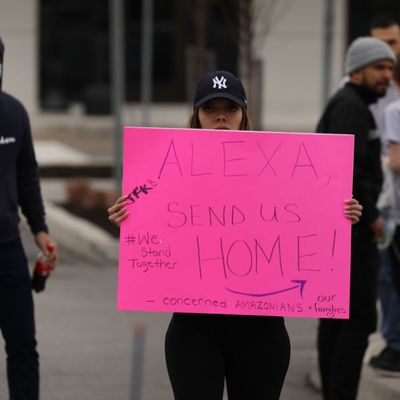
Amazon’s labor woes are multiplying. According to Athena, a coalition of over progressive organizations that lobby Amazon for better working conditions, over 300 people called out of their shifts at 50 fulfillment centers on Tuesday. It is the biggest mass action by Amazon workers to date and may be a harbinger of pandemic-era protests to come. “We are essential workers, but we’re not receiving essential protection,” said Jaylen Camp, who works in a Michigan fulfillment center.
The protest follows weeks of bad press for the e-commerce giant. As reports of positive COVID-19 tests proliferate among its workforce, workers have blamed Amazon for pervasive failures. Social distancing is difficult in the crowded centers, but the company has still threatened to fire workers who don’t stay six feet apart from each other. While Amazon touts its emergency sick-leave policy, the Athena Coalition said in a press release that workers who have fevers are still being sent home without pay. Fulfillment centers aren’t adequately sanitized after workers do test positive for the virus. Those conditions spurred isolated walkouts at several centers by the time of Tuesday’s protests.
Retribution from the tech company has been swift, and controversial. The state of New York is investigating Amazon for its decision to fire Chris Smalls hours after he led a small walkout at his Staten Island fulfillment center. In Minnesota, the company fired a warehouse worker who’d criticized it publicly for its response to the outbreak. Though Amazon says the worker, Bashir Mohamed, used “inappropriate language” and violated social-distancing guidelines, Mohamed told BuzzFeed News that he believes he was fired for his activism. Warehouse workers in Chicago filed labor charges against Amazon, claiming that the company had penalized them for participating in protests and walkouts. Finally, two tech workers, Emily Cunningham and Maren Costa, lost their jobs after they distributed a petition urging the company to improve benefits and conditions for warehouse staff. Amazon said they had violated unspecified “internal policies.”
In a statement to Intelligencer, Amazon spokesperson Rachel Lighty downplayed the extent of Tuesday’s protest, saying that over 250,000 people reported for work as usual. “Reports of employee participation in today’s event organized by labor unions are grossly exaggerated,” she said. “The union organizers’ claims are also simply false — what’s true is that masks, temperature checks, hand sanitizer, increased time off, increased pay, and more are standard across our network because we care deeply about the health and safety of our employees. We encourage anyone to compare the health and safety measures Amazon has taken, and the speed of their implementation, during this crisis with other retailers.” Amazon also says it believes its sanitization process is adequate, and that it performs deep cleaning after a positive COVID test on a case by case basis.
But Camp and other workers say that Amazon’s safety measures aren’t as uniformly implemented as its public statements insist. Though he concedes that Amazon has made “small” changes, he believes the company is capable of more. “The only thing new is the temperature checks, and they put a lot of tape down directing traffic, which is not enough,” he said. He’d prefer the company use a barricade or better enforce its own regulations.
Allegra Brown, who works for a fulfillment center in New Jersey and also called out of work, said that she still doesn’t have enough masks for her shifts. And while the company did provide bottles of hand sanitizer in a break room, she said that managers removed it and now keep it in their office “for themselves.” As for social distancing, workers “don’t have the space,” she said. The extra workers hired by Amazon to meet increased demand might make matters even more dangerous. “A lot of the aisles are very narrow and small. The amount of people that they’re hiring and bringing in every day, it’s impossible to social-distance,” she added.
Though Amazon’s statement blamed Tuesday’s protest on its nemesis, organized labor, Brown and Camp both say they aren’t seasoned activists. Brown, for example, says that she’s only been involved with organizing for a few weeks. But they’re angry now and believe the company continues to risk their health. Camp told Intelligencer that the company dragged out its pandemic response for one simple reason. “It’s going to affect their revenue streams,” he said. “In my mind, they don’t care enough about us.”
This piece has been updated.






























